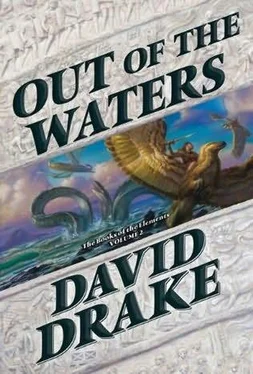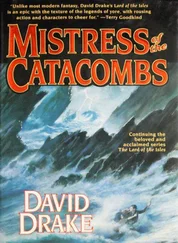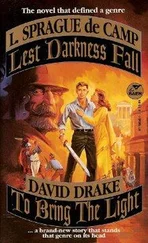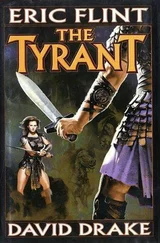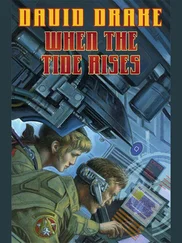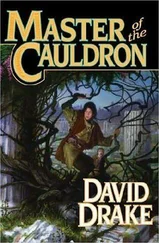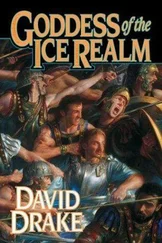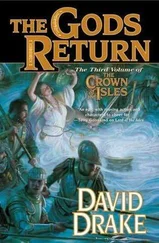David Drake - Out of the waters
Здесь есть возможность читать онлайн «David Drake - Out of the waters» весь текст электронной книги совершенно бесплатно (целиком полную версию без сокращений). В некоторых случаях можно слушать аудио, скачать через торрент в формате fb2 и присутствует краткое содержание. Жанр: Фэнтези, на английском языке. Описание произведения, (предисловие) а так же отзывы посетителей доступны на портале библиотеки ЛибКат.
- Название:Out of the waters
- Автор:
- Жанр:
- Год:неизвестен
- ISBN:нет данных
- Рейтинг книги:3 / 5. Голосов: 1
-
Избранное:Добавить в избранное
- Отзывы:
-
Ваша оценка:
- 60
- 1
- 2
- 3
- 4
- 5
Out of the waters: краткое содержание, описание и аннотация
Предлагаем к чтению аннотацию, описание, краткое содержание или предисловие (зависит от того, что написал сам автор книги «Out of the waters»). Если вы не нашли необходимую информацию о книге — напишите в комментариях, мы постараемся отыскать её.
Out of the waters — читать онлайн бесплатно полную книгу (весь текст) целиком
Ниже представлен текст книги, разбитый по страницам. Система сохранения места последней прочитанной страницы, позволяет с удобством читать онлайн бесплатно книгу «Out of the waters», без необходимости каждый раз заново искать на чём Вы остановились. Поставьте закладку, и сможете в любой момент перейти на страницу, на которой закончили чтение.
Интервал:
Закладка:
Lann put his head down and bulled his way on all fours into the screaming crowd. The spectators were too closely packed for him to shove them out of the way: rather, he crushed them down or hurled them into the air like spray from the prow of a ship.
The warships in the sky continued to maneuver. Two more had struggled through the portal and a third was on its way. Carce's sole defender slanted toward them, but it couldn't forever stop a fleet as big as the one Hedia had seen in the skies above Poseidonis.
And when it lost the unequal struggle, Carce had no other defense.
Varus stood at what he thought was a safe distance from the spire's double doors. He expected them to swing outward and possibly to swing very fast, because he couldn't assume that they would be bounded by the constraints of the material world.
Instead of opening, the black crystal valves dissolved into a thin haze. Through it he could see figures moving.
Varus grinned wryly. He had been correct in realizing that the doors might not open like those of the Emperor's townhouse. He had been wrong in his unstated assumption that they would open in the material plane. Pandareus would be disappointed at the blinkered viewpoint his student had demonstrated.
I wonder if I'll ever see Pandareus again?
A sheet of lightning covered the sky for long moments, pulsing among the clouds. Beneath the shadowed gloom that followed, Varus walked toward Procron's fortress. The Sibyl was at his side, her expression unreadable.
She looked toward him and said, "There are many futures, Lord Wizard. In some of them you meet Pandareus again. Do you wish to know which of the Fates' threads you walk?"
"It doesn't matter," Varus said. Until he spoke, he hadn't realized how completely true the statement was. "This is my duty, so I'll carry it out to the best of my abilities."
It was easier to get on with life when one disregarded questions of personal survival. Zeno of Citium and those who had developed his Stoicism would be pleased that a young scholar had achieved such understanding.
The Sibyl made a sound like a pour-spout gurgling. It was probably meant for a chuckle. Anyway, it allowed Varus to smile at himself as he walked beneath the pointed crystal arch and felt gray fog enter his bones.
Varus paused. He had expected-without consciously framing the question; Pandareus will be disappointed-the fog to be a membrane, a permeable replacement for the solid doors. Instead it was a dim cave which branched in more directions than he could count on his fingers.
The Sibyl pointed her right arm forward and said, "Grant me a path-"
"-over which I may pass in peace…," continued Varus in the same high-pitched voice. He was reading the scroll open in his mind. "For I am just and true!"
Despite the situation, he felt his lips rise in a smile. Every philosopher should be just and true. I at least strive for those ideals.
A tube of rosy light snaked through the fog, wide enough for two to walk in. It went farther-much farther-than should have been possible within the crystal spire, which Varus had judged to be no more than a hundred feet in diameter at the base.
Still, he couldn't be in doubt as to his path; he strode in and walked as briskly as he would have done in Carce, passing from his father's house to the Forum or perhaps to a temple whose library he wanted to consult.
In Carce Varus would have had a guard of servants, to keep his surroundings at bay; here the light did the same. Occasionally something came close enough to the glowing boundary to give him a good look at it. He passed three slender forms in flowing tunics who stood arm in arm, watching him with wide eyes. They were as supple as the Graces themselves; he couldn't guess at their gender or even- "Sibyl?" Varus said. "Are they human?"
"What is human?" the old woman said. "Many scholars including Aristotle have debated that. None of them came to a decision that you were willing to accept, Lord Varus."
Then in a less whimsical tone she said, "Their ancestors were human. Whether or not they remain human is a question for philosophers, not for a soothsayer."
I can be a very frustrating person to talk with, Varus thought again. If I'm really talking with myself.
He smiled again. He was amused at the insight-and he was amused that he had found a purely philosophical question to take his mind off the problem of what lay in his own immediate future. Both problems were insoluble, but considering the definition of "humanity," wasn't emotionally trying.
For a moment, Varus saw vast machines beyond the faint rosy membrane, deeper shadows bulking in the purple-gray dusk. They moved repetitively, the movement visible though the forms were only blurs. He could not tell how distant what he saw was, or even if he was truly seeing anything.
As suddenly, he stared upward at horror: Ocean given physical form. A thousand ravening maws slavered toward him, tens of thousands of limbs kicked and clawed and coiled-and then storm-tossed water surged down, a sea greater than the world itself. Froth flicked from the whitecaps. Monster or ocean met eye-searing purple lightning and vanished into haze, through which the reborn terror drove to vanish in turn. The roar was deafening.
"Perhaps, Gaius Varus, you should consider preserving your fine mind by leaving this place," the Sibyl said. "You are still able to, you know."
Varus glanced at her in irritation. "To go where?" he asked. "Back to Carce, where Typhon will be driven if I don't stop Procron here?"
She gave him another enigmatic smile. "You don't mind my suggesting that you are a coward," she said in a musing tone, "but flawed logic offends you. Does that make you a brave man, Lord Wizard, or a fool?"
"Nothing historians have taught me about battles," Varus said, "makes me think that one man cannot be both. Publius Corylus has many stories of the army which have caused me to wonder if it's possible to be a brave man and not a fool."
"'It is a sweet and proper thing for a man to die for his fatherland,'" the Sibyl quoted. "Was Horace a fool, Gaius Varus?"
"No," said Varus. "Because he threw down his shield and ran instead of dying."
He paused, rolling the thought around in his head. Very precisely he went on, "Horace was not a fool; but he was worse than a coward to urge others to act and therefore die in what he thought was a foolish manner."
Varus cleared his throat and continued, projecting as though he had an audience beyond monsters and a figment of his imagination, "I honor Horace as a poet, perhaps the greatest of our poets. But I would prefer to die at the side of my friend Corylus than to live with the soul of Horace."
The Sibyl chuckled. Unexpectedly, she reached out and squeezed his hand. "The men of Carce have not changed since my girlhood," she said.
Which is a puzzling thing to hear from a figment of my imagination.
They were walking down a tube through darkness again. Varus hadn't missed a stride beneath the threat of Typhon-or of the sea, if there was any difference-but he felt more comfortable in this neutral setting. Well, he felt less uncomfortable.
He glimpsed movement to the side and turned, wondering if he would see another of the androgynous maybe-humans. Instead he frightened into scurrying panic a handful of the rabbitlike animals which he had seen scampering outside on the moor. They disappeared into the shadows of the low, black vegetation.
"Their ancestors were human also," said the old woman. She was watching Varus, perhaps to see how he took the revelation. "The world grows old, and her children age with her."
"I see," said Varus. The only emotion he felt was wonder. He was beginning to understand the passage of long ages, which had been only a concept to him in the past.
Читать дальшеИнтервал:
Закладка:
Похожие книги на «Out of the waters»
Представляем Вашему вниманию похожие книги на «Out of the waters» списком для выбора. Мы отобрали схожую по названию и смыслу литературу в надежде предоставить читателям больше вариантов отыскать новые, интересные, ещё непрочитанные произведения.
Обсуждение, отзывы о книге «Out of the waters» и просто собственные мнения читателей. Оставьте ваши комментарии, напишите, что Вы думаете о произведении, его смысле или главных героях. Укажите что конкретно понравилось, а что нет, и почему Вы так считаете.
